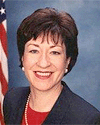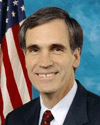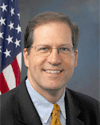| Sep. 10 | |
| Projected Senate: Dem 51 GOP 49 |
|
| Senate polls today: | (None) |
| Dem pickups (vs. 2002): | (None) |
| GOP pickups (vs. 2002): | (None) |
The Republicans have 22 seats at stake in 2008 and the Democrats have just 12. Nevertheless, many of these are safe seats, so the numbers don't tell the whole story. Below are the races expected to be competitive. However, potential retirements in half a dozen states could easily change the picture. See also our list of all 2008 Senate races and also the hottest 2008 House races.
Colorado
| Challenger | Challenger | Notes |

Bob Schaffer (R) |

Mark Udall (D) |
When he was first elected in 1996, Wayne Allard promised to serve only two terms. True to his word, he has announced he will not run for a third term. Colorado has been trending Democratic in recent years. While George Bush carried the state by 6% in 2004, Colorado also elected Ken Salazar (D) to the Senate the same year and just elected Bill Ritter (D) governor by 15%. Furthermore, the Democrats control both houses of the state legislature. Colorado will be the Democrats' number 1 target in 2008. Rep. Mark Udall has announced he is running and unlikely to be challenged in a primary. He has a very strong environmental record in this environmentally conscious state. The most likely Republican is former Rep. Bob Schaffer. Schaffer ran for the Senate in 2004 but lost to Pete Coors in the Republican primary. |
Louisiana
| Incumbent | Challenger | Notes |

Mary Landrieu (D) |

(R) |
Mary Landrieu is one of the two Democrats who barely squeaked by in 2002, having won in a runoff with 52%. The Republicans have her in their crosshairs. They might try to blame hurricane Katrina on her (or more specifically, her response to it), but that would be playing with fire as she would would likely then blame the Republican administration. Her net approval rating is +10%--not great--so this is one of the Republicans best chances for a pickup. Her worst problem is that hundreds of thousands of people, most of them Democrats, left the state after the hurricane. Still, she is an incumbent and the recent disclosures that the other Louisiana senator, David Vitter (R-LA), has a long history of frequenting prostitutes, doesn't help the image of the Louisiana Republican party. The GOP's biggest problem: no candidate. Landrieu trivia: Her father, Moon Landrieu, was mayor of New Orleans from 1970 to 1978, and her brother is the current Lt. Governor of Louisiana. |
Maine
| Incumbent | Challenger | Notes |

Susan Collins (R) |

Tom Allen (D) |
Susan Collins represents a dying breed: moderate Republicans from the Northeast. New England used to be run by them, but they have suffered major losses in recent years. Collins is personally popular, but so was Lincoln Chafee in Rhode Island, and it didn't save him. Also working against Collins is her 1996 pledge to serve only two terms, something she repeated in 2002. She recently decided to break that promise and run for a third term. Her opponent, Rep. Tom Allen from ME-01 (who already represents half the state in the House), will undoubtedly harp on the broken promise. This seat will be very competitive. |
Minnesota
| Incumbent | Challenger | Notes |

Norm Coleman (R) |

(D) |
Norm Coleman will be the Democrats number two target in the Senate in 2008. He won his seat in 2002 by a tiny margin after his Democratic opponent, Paul Wellstone, was killed in a plane crash two weeks before the election. The Democrats hastily got former Vice President Walter Mondale to take Wellstone's slot on the ticket, but Mondale was unable to do what Frank Lautenberg pulled off in New Jersey--suddenly jump in and win. Both parties are keenly aware that in Nov. 2006, Hennepin County Attorney Amy Klobuchar (D) crushed Rep. Mark Kennedy (R) by over 20% for an open Senate seat. |
Nebraska
| Challenger | Challenger | Notes |

(R) |

(D) |
Sen. Chuck Hagel (R-NE) is retiring after his second term. It is expected that the Republicans will have a primary between Attorney General Jon Bruning and former Secretary of Agriculture Mike Johanns. The Democratic nominee might be Bob Kerrey, currently president of a university. While Nebaska is deep red, Kerrey has won statewide office in Nebraska three times, twice for the Senate and once for governor, so he is well known and well liked in Nebraska. Hagel's retirement has turned what was a sure Republican seat into one that probably leans Democratic, given Kerrey's track record. Kerrey has not announced yet, but his announcement is expected within a week or two. |
New Hampshire
| Incumbent | Challenger | Notes |

John Sununu (R) |

(D) |
John Sununu had not really been on the radar until Nov. 7, 2006, when a political tsunami hit New Hampshire. John Lynch (D) was reelected to a second two-year term with an incredible 74% of the vote, the largest percentage in a gubernatorial race in state history. A totally unknown antiwar activist, Carol Shea-Porter (D), defeated incumbent congressman Jeb Bradley (R) in NH-01 and lawyer Paul Hodes (D) defeated incumbent congressman Charlie Bass (R) in NH-02. The Democrats also swept to power in both houses of the state legislature for the first time since 1874. Former governor Jeanne Shaheen is contemplating a run against him. If she runs, Sununu is in deep dudu. The polls show her winning by 20%. Sununu trivia: His father was governor of New Hampshire and Bush 41's chief of staff. |
New Mexico
| Incumbent | Challenger | Notes |

Pete Domenici (R) |

(D) |
New Mexico is truly a swing state. In presidential races, it is split right down the middle. It also has one Democratic senator (Jeff Bingaman) who wins in landslides and one Republican senator (Pete Domenici) who wins in landslides. Under normal conditions, Domenici would be a shoo-in for a seventh term, but recent relevations that he tried to get U.S. Attorney David Iglesias fired for not prosecuting Democrats vigorously enough will surely hurt him badly. If DSCC chairman Chuck Schumer can come up with a good candidate, this could become a competitive race. Domenici trivia: He used to be a junior high school math teacher. |
North Carolina
| Incumbent | Challenger | Notes |

Elizabeth Dole (R) |

(D) |
Liddy Dole did a spectacularly bad job as head of the NRSC recruiting strong senatorial candidates to challenge weak Democratic senators, such as the Nelson boys. Will the people of North Carolina blame her for losing the Senate? Probably not since most people (except politicians and political junkies) have never even heard of the NRSC. She won by 9% in 2002 and has a +20% net approval rating, so if she decides to stay she has a decent shot at it unless the Democrats can recruit a strong challenger. Dole trivia: Her husband was a long-time senator from Kansas and the losing Republican presidential candidate in 1996. Then he switched from elections to erections and became the national spokesman for Viagra. |
Oregon
| Incumbent | Challenger | Notes |

Gordon Smith (R) |

Jeff Merkley (D) |
Gordon Smith is a moderate senator in a state that is trending Democratic. Although he won by 16% in 2002, his net approval rating is only 11%. While he has a decent chance of being reelected, a strong Democratic opponent could run the same campaign against him that Sen. Sheldon Whitehouse (D-RI) ran against Lincoln Chafee (R) in Rhode Island: "Smith is a nice guy but do you want Mitch McConnell to be majority leader?" Two Democratcs have announced so far so there will probably be a primary unless one drops out. By far the stronger candidate is Speaker of the Oregon House, Jeff Merkley (pictured at left). He is being challenged by Steve Novick, a lawyer who has never held political office. This is the kind of race where Chuck Schumer, chairman of the DSCC, is likely to take sides, pumping money into the campaign of Merkley, a tested politican who is well known in the state. |
South Dakota
| Incumbent | Challenger | Notes |

Tim Johnson (D) |

(R) |
Tim Johnson is one of the two most endangered Democratic senators. He got just 50% of the vote in 2000 against John Thune, who ran again in 2004 and beat Tom Daschle. Furthermore, South Dakota is a heavily Republican state. Despite his narrow win in 2002, Johnson has a +46% net approval rating, so the people of South Dakota like the way he is doing his job. Unfortunately, Johnson suffered a cerebral hemorrhage Dec. 13, 2006. He was operated on immediately and is now recovering. All signs show that he intends to run for reelection in 2008. While he is in no condition to campaign now, a group of his (Democratic) friends in the Senate have begun holding fundraisers for him, so when he is ready to hit the campaign trail, he will have plenty of money. All this puts potential Republican candidates in a bind. Actively campaigning against a very popular senator who had a stroke makes them look mean. If Gov. Mike Rounds runs, it will be a real horse race; if Rounds declines, Johnson will be reelected as the GOP bench is thin here. |
Virginia
| Challenger | Challenger | Notes |

(R) |

(D) |
Sen. John Warner (R-VA) has decided to retire after his term is over in Jan. 2009. He will be 88 at the end of another term (to which he could easily be elected), but he is disgusted with George Bush's refusal to listen to the senior Republicans in the Senate on Iraq. Former governor Mark Warner (D) is likely to be the Democratic nominee. Mark Warner is young, attractive, and made about $200 million as a cell phone entrepreneur, so he can finance the campaign himself. In contrast, the Republicans are likely to have a bitter and bloody primary between Rep. Tom Davis (John Warner's favorite) and former VA governor Jim Gilmore. When the primary is over, the winner will have to face a fresh popular Democrat flush with cash. Also troublesome for the GOP is that the Northern Virginia suburbs, which are heavily Democratic, are growing rapidly and led to the election of Jim Webb (D) as senator in 2006 and Tim Kaine (D) as governor in 2005. Warner's retirement has suddenly made Virginia a likely Democratic pickup. |
Back to the main page.